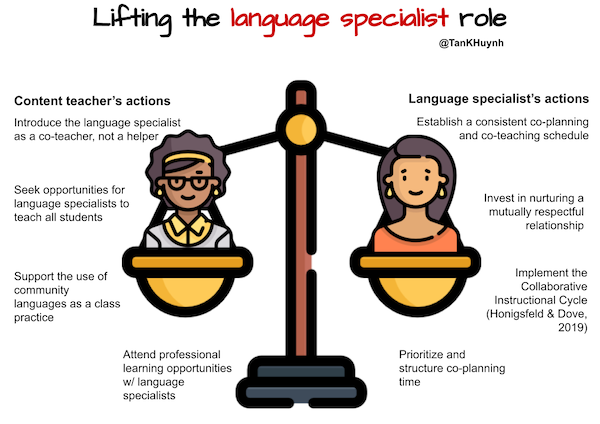Lifting Up the Language Specialist’s School Role
A MiddleWeb Blog

The request came like a slap in the face and left me emotionally bruised. The teacher proceeded to say that they were a fluent English speaker and licensed to teach English if they wanted to. I raised an eyebrow, bit my tongue, and we finished our co-planning as scheduled. I never returned to work with that teacher again.
I’ve often wondered if I was not an openly gay, former refugee of Vietnamese descent and instead a white, cisgendered male born in America, would I have endured the same abuse?
Dr. Greg McClure and Dr. Melisa Cahnman-Taylor would suggest that the power imbalance that I experienced is a repeating narrative for many language specialists, especially those of marginalized identities.
Recognize the potential for power inequities in co-teaching
If not shaped appropriately, these power dynamics can significantly derail a partnership. The teaching conditions experienced by homeroom or content teachers lend themselves to having more power (Honigsfeld & Dove, 2022):
- on students’ schedules, the content teacher is the only one listed
- students arrive at the content teacher’s room
- the content teacher sees students on a more regular basis than the language specialists
- the students see the content teacher as the only one with content expertise
- the content teacher might enjoy privileges given by a dominant society
None of these conditions are the fault of content teachers. Yet we should examine how they interact and collaborate with their specialist colleagues. Classroom conditions already tip the power scale against the specialists, who often:
- have marginalized identities
- speak with an accent
- see students on a less regular basis
- are legally assigned to specific students, often who also have marginalized identities
Likewise, none of these conditions are created by the specialists; yet often these factors shrink the value specialists can contribute to student learning.
Suggestions for content teachers
Just like we see our multilinguals through an asset lens, we must see all the valuable ways our language specialist colleagues, especially ones with marginalized identities, can contribute to students’ learning. From this perspective, we are more likely to incorporate our colleagues in deeper aspects of teaching. Other things content teachers can do involve:
- introducing specialists as an equal teacher in the class, not a helper
- seeking opportunities for the specialist to co-teach the whole class at the beginning, middle, or end of the class or the entire class period
- support language specialist using students’ home language during class
- attend professional learning with the language specialist when sessions pertain to multilinguals
Suggestions for specialists
In order to be powerful, we must first own our own power. Where society might see limitations, we must see treasures. Language specialists have unique roles when co-teaching, not lesser ones. The things we can do to create dynamic co-teaching partnerships are:
- prioritize and structure your co-planning time
- invest in nurturing a mutually respectful relationship
- implement the collaborative instructional cycle (Honigsfeld & Dove, 2017)
- co-create a consistent co-planning and co-teaching schedule with content teachers
- integrate culturally relevant pedagogy for multilinguals (Snyder & Straehr Fenner, 2021)
Suggestions for administrators
Principals and district administrators play an outsized role in the way language specialists are valued by their colleagues, students, and families. Administrators set the pitch and tone around language specialists. Therefore, to lift language specialists and support co-teaching, principals can:
- invite friends to co-teach together
- incentivize co-teaching partnerships
- highlight successful co-teaching relationships
- endorse the use of home languages by teachers and students
- attend professional learning opportunities centered on multilinguals
- message that co-teaching is a wonderful professional learning opportunity
- consistently share contributions from language specialists, especially those of marginalized identities
Conclusion
Power is not only given but reinforced one interaction at a time. We must sit and do the hard work of reflecting on how we enjoy the fruit of institutionalized power or how we are handicapped by it. The chains that work to limit marginalized students are the same chains that hold down marginalized faculty members.
References
Cahnmann-Taylor, M., & Souto-Manning, M. (2010). Teachers Act Up!: Creating Multicultural Learning Communities Through Theatre. Teachers College Press.
Dove, M. G., & Honigsfeld, A. (2017). Co-Teaching for English Learners: A Guide to Collaborative Planning, Instruction, Assessment, and Reflection. Corwin.
Honigsfeld, A., & Dove, M. G. (2022). Portraits of Collaboration: Educators Working Together to Support Multilingual Learners. Seidlitz Education.
Snyder, S. C., & Staehr Fenner, D. (2021). Culturally Responsive Teaching for Multilingual Learners: Tools for Equity. Corwin.


































